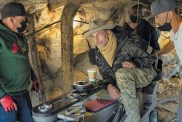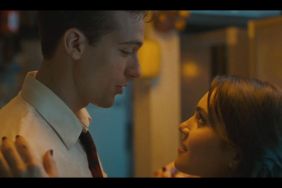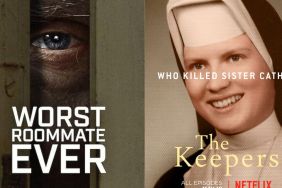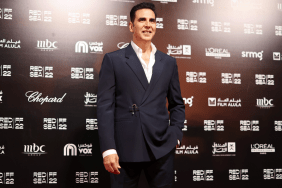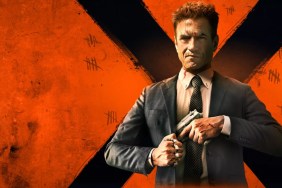After spending years making The Kid Stays in the Picture, a film about Hollywood producer Bob Evans, with Brett Morgen, filmmaker Nanette Burstein decided to take on a more personal story for her third full-length documentary American Teen.
Camping out in Warsaw, Indiana for a year, Burstein spent that time following a group of five teenagers through their senior year at high school, talking to them about their hopes and dreams and watching as some are fulfilled while others are waylaid by the realities of life. Unlike the MTV-style shows we’ve seen about high school kids that tend to gloss over the real drama, Burstein has found a way to capture every aspect of their life to make them seem that much more real, making these teens ones that everyone can relate to, however young or old you may be.
All five fit into classic high school archetypes, but they’re all unique individuals with their own stories that unfold in front of Burstein’s ever-present camera: Hannah is the school misfit, a musician, a hopeful filmmaker and a free-spirited liberal living in a conservative religious town. Jake is the typical shy high school nerd, playing in the marching band and hoping to one day have a girlfriend. Megan is a popular girl from a wealthy family who has to live up to her family name while dealing with her role as the student council vice president, but her bitchy attitude hides a tragic secret. Colin is the star player on the Warsaw High School basketball team having to live up to his own expectations, while his teammate Mitch goes against the social status lines by showing interest in Hannah.
Having just had a baby, Burstein hasn’t been able to travel around the country talking about the movie, but ComingSoon.net got on the phone with her to talk about this intriguing look at suburban teen life.
ComingSoon.net: There have been a lot of reality shows and television docs about teens in high school, so what made you want to do a feature documentary about them?
Nanette Burstein: For me, high school was a really formative time of my life, and I went through a lot of difficulties and it helped me form the person that I became and my identity and it pretty much happened in the four years of high school, especially my senior year. Despite the fact that there are a lot of teenage films and reality shows on teenagers, I felt like they were not that honest often, or just didn’t go into the complexities of being a teenager. Fiction films tend to be made and marketed for tweens, so they tend to have a fairy tale quality, and a lot of the reality shows are either mean-spirited or they tend to focus on the wealthiest teenagers in America, like “My Sweet Sixteen” or “Laguna Beach” or “The Hills.” I felt like there needs to be something really good about being that age.
CS: Did you want to make a film that was geared more towards teens or adults and parents/
Burstein: Well, its something for both, because I think that when you’re making movies, at least until that point, movies for teenagers about teenagers tended to be one-dimensional and talking down to them. Recently, that’s changed with movies like “Juno,” or “Superbad,” what you have are movies that appeal to both teens and adults because there’s a specification to the storytelling. I think this film fits into that and I’d always intended for that because I didn’t think I could make a film, just given my personality, that would talk down to teenagers. I think at the time that’s what kind of movies were being marketed to them.
CS: When I went to high school, everyone was always trying to escape from it, and you see that in your movie, but as you get older, it seems like as adults, we look back nostalgically at high school.
Burstein: I think because it’s such an important time in our lives. People come away with either psychological damage or fond memories, but most of us come away with both, so when we’re out of it, it’s not that painful anymore. It comes up at different points in our life. You have these feelings and you can trace them back to insecurities or a sense of freedom that you trace back to high school, so I think that’s where our fascination comes from later in life.
CS: How did you end up in Warsaw, Indiana specifically?
Burstein: I wanted it to be in a town that had only one high school because I thought that it would be harder to escape from your social reality. If you were super popular, you’d have all this power and if there’s a rumor spread about you, there’s nowhere to escape. It’s not like a big city where you can get lost if things aren’t going well or hang out with kids from a different school. You’re stuck, so I thought it would be more of a social pressure cooker. Then, I wanted it to be a town that was economically mixed so you have different social classes, I was hoping for racial diversity, but I chose in the Midwest, and it was hard to find small towns that had racial diversity in the Midwest, it was practically nonexistent.

CS: That probably would’ve been a completely different spin on the movie too if you had different racial groups, and not just the rich, the poor, the popular and the not.
Burstein: Right, so then I needed it to be a high school that would cooperate, so I called a hundred fifty high schools in four different states. I got ten. I went to each of them and interviewed all the incoming seniors that were interested, and I ended up interviewing over a couple thousand teenagers. At that point, where I ended up was going to be by the kids that I found and the ones that had the most compelling stories.
CS: Did you film all of those initial interviews, like a screen test?
Burstein: Yeah, I have all the interviews. In fact, at one point right before Sundance, we put up the interviews of the kids that we cut down, because I had to actually edit it down anyway because A&E was financing a lot of the film and they wanted to see edited-down versions of the quote-unquote casting tapes and first interviews, and so I had put up the first interviews with the kids that I had done and ended up in the movie. It was funny because I hadn’t looked at them since I made them in three years, two a half years.
CS: Is that how long ago you shot it?
Burstein: By now, yeah. It was 2005 through 2006, so two years really. I spent a year of editing, that’s why, but I realized why I picked them. (laughs) They were so compelling to watch.
CS: When you’re making a movie about Bob Evans, you have people interested in him and his personality, but these are unknown teens, many of types we’ve seen before. Did you have some instinct they could deliver in terms of keeping audiences interested as soon as you talked to them?
Burstein: It’s always a risk when you make this type of film, but I picked people that had really compelling stories. They all needed to achieve something, so you know you would have a dramatic storyline that wasn’t used to seeing in movies or reality TV. Maybe in fiction you’d see that story but it would be told in a very conventional way that didn’t really get into any of the details or complexities real people, it’s a fairy tale. So you’d have Colin, who needs to get a basketball scholarship or he’s going to have to go into the army. That’s a dramatic story line and each of them have that, and I just knew that I was going to tell it in an intimate way. I’ve never seen that done, so you never know if it’s going to work or not and if it’s going to be convincing enough that it’s different enough for people to appreciate, but you just have to rely on your filmmaking skills. (laughs)
CS: Another thing that was important was getting them comfortable on camera and gaining their trust, not just the kids, but also the families because you captured a lot of stuff which is very personal, stuff they wouldn’t want to be remembered by the entire world in a movie. After a while, were you just able to blend in the background?
Burstein: Most people don’t. When they make a reality TV show, they film for a couple of months and then they make a TV show out of it. Most people don’t move to a place and film every day for an entire year, and that kind of time allows you to develop a real relationship with people, and they can trust you, and you’re around a lot, so it gives you a whole different dynamic of what you can film that is rarely done.
CS: So you spent a year of filming and a year of editing, so you basically had to edit one day for every day you shot.
Burstein: (laughs) That is what it ended up being. I didn’t think it would be, but I thought I would edit it in half the time. I was a little optimistic.
CS: You weren’t able to be editing along the way?
Burstein: A: I didn’t have the time or resources to do it, and B: It would’ve been a mistake anyway because you don’t know how the story is going to end, so it’s hard to edit when you don’t know where it’s going. I was worried I would end up wasting time and money. I mean I certainly wanted to go over the footage that was happening and wrote out story outlines of where things were going and what I needed to keep capturing and bring up in interviews, but no, I didn’t start editing until I was fully done with shooting.

CS: How were you able to keep up with all five or six of these students at the same time during any single day?
Burstein: Well I had more than one crew. In the very beginning of the year, because I was trying to get them accustomed to the process and myself as well, I had one main camera crew and then I had a small camera which sometimes I would break off from the main camera crew and film by myself so that we could be two places at once. After three months, they got very comfortable, and I brought in a second crew so we could be in as many as three places at once. There were only four main characters at that point, and so everyone’s life takes a different arc as far as what is dramatic, so Jake might be dating some girl and you need to film him all the time for three weeks, and then he’s watching TV and nothing’s happening to him. There were ebbs and flows, and basically what I’d do, myself and my field producers Rebecca Camisa and Greg Orselli–and they were very liked by all the teenagers and we loved them as well–we would show up to school every day and catch up with all the teenagers at lunch time and find out what was going on at a daily basis with them in their lives and figure out where to be. If nothing was going on, we would just do interviews.
CS: There’s a strange phenomenon with documentary filmmakers, almost like Stockholm Syndrome. When you make a documentary, you have to be really invested in your subject obviously. How can you make a movie like this and be invested, but still be a passive observer?
Burstein: You’re not a passive observer. You do get involved and there’s a lot of stuff happening when you’re not shooting, and a lot of time spent when you’re not filming hanging out and giving advice. There’s moments where you just need to let things happen because that is life and if you want to capture an honest moment, you shouldn’t interfere, but then afterwards you do have a friendship and a relationship to talk to them about things.
CS: Whether it was on purpose or because of editing, you do end up with a “villain” in the movie, and that’s Megan, which may be unfair because she’s a young person who makes mistakes, like we all do, but she does end up in that role.
Burstein: Well, I think there is a balance to that. The reason why I picked her is I think she’s the most complicated person. On the one hand, she does have a bitchy side, and she does take revenge if she feels that she’s being crossed. I think especially in the way that it’s edited people do develop certain feelings for her in the first half of the film, and then I think they are quite surprised to find out that she’s going through the heaviest tragedy out of all of them, dealing with these difficult issues. You really understand where her rage comes from, and then on top of that, the kind of family pressure that she’s under about college is directly related to the family tragedy. I think that often kind of character, whether real or imagined in the fiction film is portrayed in such a one dimensional way and I find her to be so much more complicated than that, hopefully I wasn’t unfair that way.
CS: No, I definitely got that out of it. When you finished editing the movie before Sundance, did you show it to the five teens in the movie?
Burstein: Yeah, I did actually and they all really liked it a lot, and they came with me to Sundance.
CS: Right, because they wouldn’t have been involved with promoting it at Sundance otherwise. None of them had any problems or issues with the way they were portrayed?
Burstein: Yeah, and their parents have all seen it and everyone’s behind it. They’re actually working with Paramount for the summer in helping marketing the movie. They’re very excited about it, and they feel that even in some of their less flattering moments, they feel it is a very honest portrayal of who they are, or who they were at least.
CS: That’s right because you said that it’s almost three years ago now, so that must be very interesting for them to watch after that time.
Burstein: It is and I told them when I was making the film, I was like, “Listen, it’s going to take me a while to edit this and you’re going to be out of high school. You’re going to be in college, you may even be in your sophomore year,” which is exactly what happened, “It’s not going to have that same kind of intensity for you because you’re going to look back and say, ‘that’s where I was, that’s not where I am now’, because you will change. Everybody does by the time they’re a sophomore in college.” That is really what happened, and even Megan, she’s like, “Yeah listen, that’s who I was. I was a bitch at that time in my life and I’m different now. I’ve matured a lot and I’m comfortable with how I’m portrayed.”

CS: I can’t even imagine what it might be like if every single person had their high school years documented in a movie. That could blow a lot of minds.
Burstein: It takes courage, but I think it will forever be fascinating to them to have this document of themselves of that period of their life.
CS: Even though the movie hasn’t come out yet, have any of them had those kind of moments where people see them and go, “You’re so-and-so from that movie, right?”
Burstein: Yeah, at Sundance, because it’s such a tight community when you’re at the festival, they were like rock stars. They would walk around and I remember the second day we were all at a Mexican restaurant, and I went to go pay for all of us, and the woman was like, “Oh, somebody already paid,” and I was like, “What are you talking about?” It was this couple with their family and they were like, “We saw the movie yesterday and we just wanted to buy you all lunch.” Yeah, when we were together we were recognized, and even down in L.A. over the summer which is obviously a much bigger city, but it is happening to them to some extent, and obviously if the movie is a success, it will be much more so that way.
CS: I know Hannah left in the movie to go to San Francisco, but did anyone else remain in Indiana or have they all dispersed to different places?
Burstein: Well Hannah is in New York actually, well not right this second, but she goes to school at SUNY Purchase. Since (Sundance), I’ve put in the end of the film at the ending credits what’s happened to all of them, but Hannah ended up going to school right outside of New York at SUNY Purchase which is a film school and she loves it, and Colin is still at Indiana Tech playing basketball, and most of them are in Indiana doing what they had set out to do.
CS: One famous documentary about kids is Michael Apted’s “Up” series where he’s spent the entire lives of people, checking in with them every seven years. When you were filming or editing this, was is ever in your mind to check back in with them 10 to 15 years later to see how they turn out?
Burstein: No, I really just wanted to capture this one time. There actually is an American “7 Up” series, and “7 Up” is done a very different way. It’s all interviews, it’s not any kind of narrative or observational. It has a very different approach from the outset, and it is fascinating–I have followed the “7 Up” series–but this is really just about that time in high school of your senior year.
CS: In the end, what do you feel most people get out of the movie if only an interesting look at high school?
Burstein: To me, the theme is really about how hard it is to form your own identity at that age and you’re at that age, at seventeen, where for the first time in your life, you’re starting to figure out who you really are, but it’s so hard because your peers put you in a box and see you one way, and then your parents have very, very different ways at how they see your life unfolding. (laughs) It’s very hard to be yourself, and with Hannah, the fact that she’s able to get out and study in New York or L.A. and be a filmmaker against her parents wishes and in her community, it’s such an unusual thing to do. You relate to them, either defying or going with conformity that way, exploring that theme and how difficult it is.
CS: Having spent so much time with them, did you see high school or teen life very different from how you remember it? Or was it the same thing, just different technology?
Burstein: Yeah, I think it is very timeless. There were a lot of the same issues I was dealing with in high school, and as you have mentioned, technology has changed and it has affected things. I think it’s made some of the meaner aspects of high school, the rumor mill and the bullying, more vicious, but other than that, I think the core emotional issues of our insecurities and vulnerability and that kind of stuff is the same.

CS: Obviously you just had a baby so you’re not working right now, but have you started thinking about what you want to do next yet?
Burstein: Yeah, well I’m working on developing a couple of fictional films because I’ve done three feature length documentaries that are very narrative and I thought, what I do with those is I start out with real life and mold them into a narrative story. This time, I’d like to start with a narrative and make sure it feels very real, just take a different approach, but it is the same thing, just have a great story ultimately.
CS: Will you write something, or are you looking for a script to direct?
Burstein: Both, I’m actually developing a script and I’m also reading scripts.
CS: I assume you’ve seen a lot of god docs and we’ve seen a lot of documentary directors moving over to the narrative side in the last couple years.
Burstein: Todd Phillips started off in documentaries and Taylor Hackford started off in documentaries. There’s been quite a few actually. It’s been very good, I don’t want to say training, because it’s very difficult to achieve in a successful way, but I do think working with real people helps you in becoming a good fictional filmmaker as well because it helps you understand real life.
CS: Do you think you’d be going back to docs eventually?
Burstein: I would love to make both, like Michael Apted did and Martin Scorcese. That would be my ideal situation.
American Teen opens in New York and L.A. on Friday, July 25 and in other cities in August.
